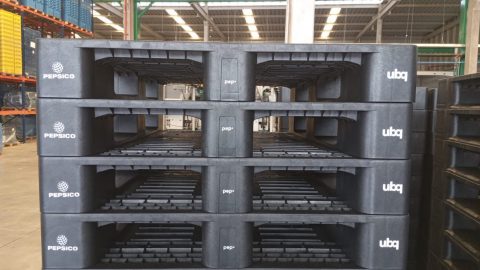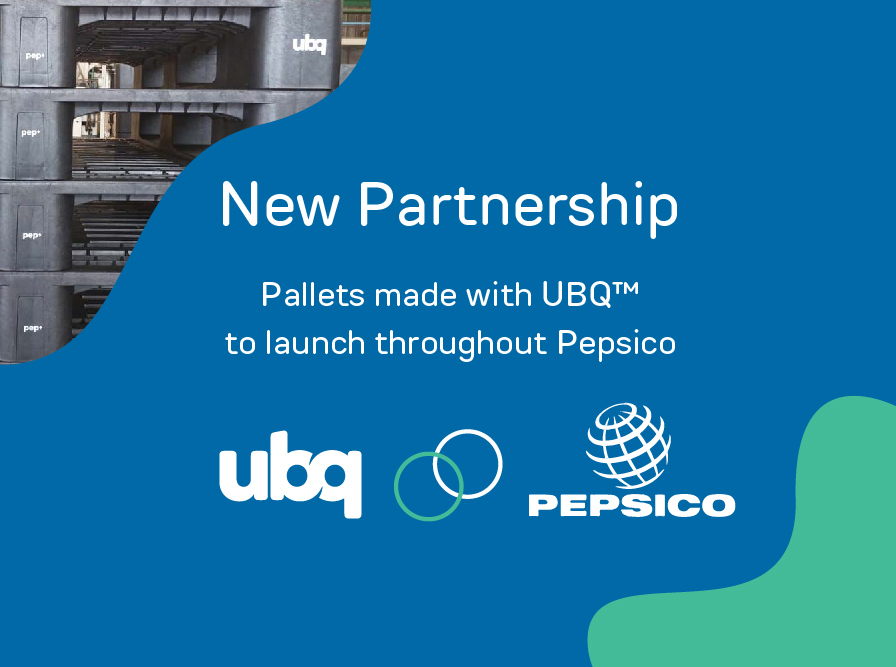SÃO PAULO, February 2022 – PepsiCo, one of the world’s largest food and beverage companies, aligned with its strategic transformation, PepsiCo Positive (pep+), which puts sustainability at the heart of the business, and with the global goal of achieving Net-Zero carbon emissions by 2040, announces use of UBQ™ material. The material, developed by the Israeli startup of the same name, will be used in the creation of a sustainable pallet that includes unsorted household waste – including organics – in its composition.
During the manufacturing process of UBQ™ material, waste is diverted and greenhouse gas (GHG) emissions are prevented. In this initial project alone, the material implementation saves the equivalent of more than 6,500 kg of GHG emissions – the equivalent of the annual carbon sequestration of 534 trees*. More than 739 kg of mixed waste will be redirected from landfills, and looped back into the material as a valuable resource. The pallets are developed by PepsiCo’s partner Ecoboxes Embalagens Plásticas, which specializes in solutions focused on sustainability and circular economy.
The UBQ™ material is a bio-based thermoplastic converted from 100% unsorted municipal solid waste, including mixed plastics, paper, cardboard, and organics, and is suitable to substitute conventional polymers in various durable applications.
The first phase of the PepsiCo project includes the manufacturing of 830 ecological pallets for use in two of the company’s logistics centers. In addition to UBQ™, the pallets are made from recycled materials that include recycled PP resin and recycled BOPP (a plastic film used in the company’s snack packaging), which completes the circular economy cycle.
“This innovation is very exciting for PepsiCo because it helps us on our journey through materials that replace virgin plastic while at the same time working on CO2 reduction. In addition, this is a differentiated material because it represents an alternative to the chain as a whole, especially with regard to collection, sorting, transportation and final disposal in landfills. Now we will go further, scale this solution in Brazil, Latin America and why not in other parts of the world,” said Raphael Cyjon, Senior Director of Operations at PepsiCo LatAm.
Also being studied is the possibility of implementing UBQ™ as a raw material for other applications across the supply chain, demonstrating the commitment of PepsiCo and its partners in the search for solutions that help accelerate its ESG agenda.

Commitment to the Planet
PepsiCo has set robust environmental goals that are part of its sustainable transformation agenda, PepsiCo Positive (pep+). These include reducing GHG emissions by 40% in less than a decade and becoming Net-Zero by 2040. In packaging, it also has global objectives that guide it in concrete actions in search of a world where plastic does not become garbage. They include cutting virgin plastic by 50% across the entire food and beverage portfolio and using 50% recycled content in its plastic packaging by 2030; designing 100% of packaging to be recyclable, compostable, or biodegradable; and investing to increase recycling rates in key markets by 2025.
*These values were calculated using GWP20 (global warming potential over a 20-year time period).
About PepsiCo
PepsiCo products are enjoyed more than a billion times a day by consumers in more than 200 countries and territories worldwide. PepsiCo generated more than $70 billion in global net revenue in 2020, driven by a complementary food and beverage portfolio that, in Brazil, includes PEPSI®, GATORADE®, QUAKER®, LAY’S®, DORITOS®, RUFFLES®, CHEETOS ®, KERO COCO®, H2OH!®, TODDY® among others. PepsiCo’s product portfolio includes a broad range of food and beverage products, including 23 brands that generate more than $1 billion each in estimated annual sales.
PepsiCo is guided by its vision of Being the Global Leader in Convenient Food and Beverages by Winning with PepsiCo Positive (pep+). pep+ is a transformative, end-to-end strategy that places sustainability at the center of how PepsiCo creates value and grows, operating within the plant’s limits and inspiring positive change for the environment and for people. For further information, visit www.pepsico.com.br.
About UBQ Materials
UBQ Materials Ltd. has developed an advanced conversion technology, patenting the world’s first bio-based thermoplastic (UBQ™) made entirely of unsorted household waste, including all the organics; a revolutionary way to divert municipal solid waste from landfills and convert it into a sustainable substitute for oil-based plastics. A certified B Corp, UBQ is a globally awarded cleantech company with customers including Mercedes-Benz, global retail solutions provider Mainetti, and Arcos Dorados, the world’s largest franchisee of McDonald’s restaurants across Latin America.
With a climate-positive impact and cost-competitive price, UBQ™ empowers manufacturers with a simple transition to greater sustainability. Learn more by visiting www.ubqmaterials.com.


